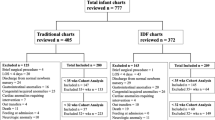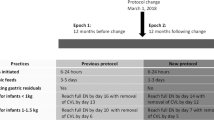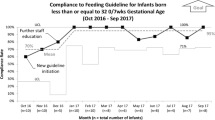Abstract
Objective:
To evaluate the adequacy and feasibility of spoon feeding in terms of physical growth and transition to breast feeding in early hospital-discharged low birth weight (LBW) neonates.
Study Design:
A trial with two independent randomized controlled trials (RCTs), which was conducted at the tertiary-level neonatal unit of a teaching hospital and included home-based treatment. Singleton live-born neonates with a gestational age of ⩾32 weeks, a birth weight of >1250 g and ⩽1600 g, and fulfilling the feeding criteria were included in the study. The study was conducted over an 18-month period with 79 and 65 subjects enrolled into two RCTs in a large trial. Weight gain pattern during the study period was the primary outcome variable, and the number of days required by the neonate for transition to breast feeding and feeding-associated morbidity were the secondary variables. In Trial I, babies were gradually transitioned from nasogastric (NG) feeding and spoon feeding to breast feeding in the hospital, whereas in Trial II, babies were transitioned from spoon feeding to breast feeding in the hospital and at home. Eligible neonates were randomized into one of the two groups in each of the two trials using a computer-generated random number sequence. Trial I consisted of NG feeding and spoon feeding groups, both in a hospital setup, whereas Trial II consisted of a spoon-feeding group in hospital and home setups.
Result:
Baseline neonatal and maternal characteristics were comparable in both groups of each trial, including maternal medical and obstetrical morbidities. In Trial I, out of 79 babies enrolled, 72 babies (91.1%) completed the study, whereas in Trial II, 92.3% (60 babies out of 65 babies enrolled) neonates completed the trial. The mean (s.d.) weight gain in neonates during the study period in Trial I in a hospital setup was 4.72 (4.68) g kg−1 per day in the NG feeding group and 4.47 (3.14) g kg−1 per day in the spoon-feeding group (P=0.8836). Similarly, spoon-fed babies gained 7.06 (4.26) g kg−1 per day in the hospital group, whereas they gained 7.56 (3.31) g kg−1 per day in the home group (P=0.5984) during the study period of 28 days. After randomization, the time taken for transition to breast feeding was 12.31 (3.32) days and 14.39 (4.10) days (P=0.0201) in Trial I, whereas it was 3.55 days and 9.81 days (P=0.0000) in Trial II in the two groups, respectively. In Trial II, the mean (s.d.) duration of hospital stay was 14.58 (2.83) days in the hospital group and 10.19 (2.26) days in the home group (P=0.0000). Neonatal morbidity was comparable during the study period in the two groups in both trials.
Conclusion:
Use of supplementary spoon feeding is found to be adequate and feasible in terms of physical growth and transition to breast feeding in early hospital-discharged (home group) LBW babies.
This is a preview of subscription content, access via your institution
Access options
Subscribe to this journal
Receive 12 print issues and online access
$259.00 per year
only $21.58 per issue
Buy this article
- Purchase on Springer Link
- Instant access to full article PDF
Prices may be subject to local taxes which are calculated during checkout




Similar content being viewed by others
References
Stevan JG, Terri AS . Feeding the low birth weight infant. Clin Perinatol 1993; 20: 193–209.
Lang S, Lawrence CJ, L'E Orme R . Cup feeding: an alternative method of infant feeding. Arch Dis Child 1994; 71: 365–369.
Malhotra N, Vishwambaram L, Indiranarayan KRS . A controlled trial of alternative method of oral feeding in neonates. Early Hum Dev 1999; 54: 29–38.
Gupta A, Khanna K, Chatterjee S . Cup feeding: an alternative to bottle feeding in a neonatal intensive care unit. J Trop Pediatr 1999; 45: 108–110.
Marinelli KA, Burke GS, Dodd VL . A combination of safety of cup feedings and bottle feedings in premature infants whose mothers intend to breast feed. J Perinatol 2001; 21: 350–355.
Seeley WG, Ellis RE, Flack FC, Brooks WA . Coordination of sucking, swallowing and breathing in the newborn: its relationship to infant feeding and normal development. Disord Commun 1990; 25: 311–327.
Dillard RG, Kononer CB . Lower discharge weight and shortened nursery stay of low birth weight infants. New Engl J Med 1973; 288: 131–133.
Hallam H . Continuing care of the high risk infant. Clin Perinatol 1984; 11: 3–17.
Schmidt RE, Levine DH . Early discharge of low birth weight infants as a hospital policy. J Perinatol 1990; 10: 396–398.
Berg RB, Salisbury AJ . Discharging infants of low birth weight: reconsideration of current practice. Am J Dis Child 1971; 122: 414–417.
Casiro OG, McKenzie ME, McFadyen L, Shapiro C, Seshia MM, MacDonald N et al. Earlier discharge with community based intervention for low birth weight infants: randomized trial. Pediatrics 1993; 92: 128–134.
Cruz H, Guzman N, Rosales M, Bastidas J, Garcia J, Hurtado I et al. Early hospital discharge of preterm very low birth weight infants. J Perinatol 1997; 17: 29–32.
Gibson E, Medoff Cooper B, Nuamab IF, Gerdes J, Kirkby S, Greenspan J . Accelerated discharge of low birth weight infants from neonatal intensive care. A randomized, controlled trial. J Perinatol 1998; 19: S17–S23.
Brooten D, Kumar S, Brown L, Butts P, Finkler SA, Bakewell-Sachs S et al. A randomized clinical trial of early hospital discharge and home follow up of very low birth weight infants. N Engl J Med 1986; 315: 934–939.
Kuppuswamy scale for socio-economic status in urban area (1994) Source: Kuppuswamy B. Manual of socio-economic status scale (URBAN) Manasayan 32 Netaji Shubhash Nagar, Delhi-110 006.
Acknowledgements
We acknowledge the advice of Professor Siddarth Ramji provided in the day-to-day management of newborns during the study period and the statistical advice of Dr L Satyanarayana.
Author information
Authors and Affiliations
Corresponding author
Rights and permissions
About this article
Cite this article
Kumar, A., Dabas, P. & Singh, B. Spoon feeding results in early hospital discharge of low birth weight babies. J Perinatol 30, 209–217 (2010). https://doi.org/10.1038/jp.2009.125
Received:
Revised:
Accepted:
Published:
Issue Date:
DOI: https://doi.org/10.1038/jp.2009.125
Keywords
This article is cited by
-
Oral Application of Colostrum and Mother’s Own Milk in Preterm Infants—A Randomized, Controlled Trial
Indian Journal of Pediatrics (2022)



